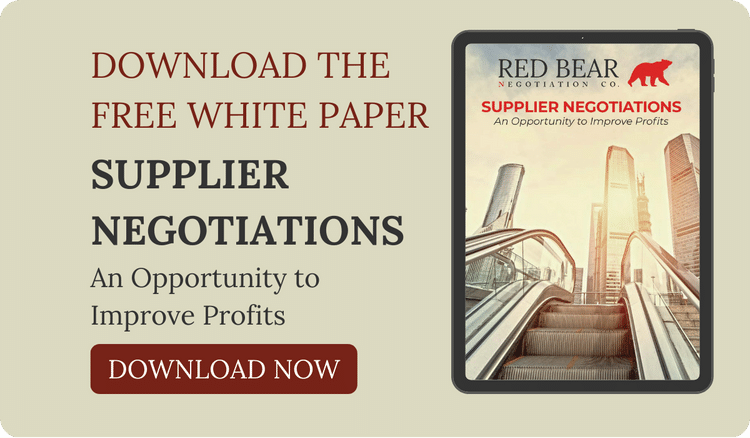Gratitude is much more than sharing niceties — especially when used in a professional setting.
It’s more than a polite gesture; it’s an incredibly effective negotiation tool. It can be the difference between heightened defensiveness and openness, poor communication and quality dialogue, lose-lose outcomes and win-win results.
Gratitude, when used correctly and genuinely, can disarm, build trust, and open creative pathways that unlock solutions to persistent problems.
Negotiations are much more than transactional. In fact, they can be transformational, encouraging parties to not just think about the immediate deal but to consider long-term relationships and outcomes.
Here at RED BEAR, we leverage a negotiation methodology that’s built on the Principles and Behaviors of successful negotiation. Today, we’ll dive deeper into the Negotiation Behaviors and uncover the potential of gratitude in negotiations.
Our mission is simple. We aim to transform individuals into world-class negotiators using the same training utilized by 45% of the Fortune 500.
In the spirit of gratitude, we’re turning back the clock and offering all clients — past, present, and future — retro pricing to celebrate our 10-year Anniversary for a limited time. That’s right. You get the same effective negotiation training used by those Fortune 500 companies for ten-year-old pricing.
There's no better time to see the value of RED BEAR training yourself.
Gratitude vs. Flattery: Know the Difference
What’s the difference between gratitude and flattery? It’s all about sincerity and genuine appreciation.
Unfortunately, flattery still can have an impact, but not as much as genuine gratitude. On a conscious level, people discount the value of a compliment based on its impersonal nature. Subconsciously, though, they still feel positive about the compliment.
Even so, the negative impact of flattery still exists. Flattery can quickly come off as manipulative or self-serving, which can be quite counterproductive in a negotiation. Flattery is a common tactic used to manipulate, and it can quickly lead to negative results.
The last thing you want is to be seen as manipulative. It can not only sour the current negotiation, but it can impact your company’s reputation in the long run.
The Psychological Impact of Gratitude
Gratitude offers benefits for both parties. Research shows it’s powerful in negotiations because it can build interpersonal ties and trigger feelings of bonding.
What does this look like? Well, let’s take the “Asking Open Questions” behavior as an example. With genuine interest and gratitude, negotiators can supercharge this action. Gratitude in question-asking may prompt more honest responses, allowing for a clearer understanding of the other party’s needs or constraints.
“Gratitude in question-asking may prompt more honest responses, allowing for a clearer understanding of the other party’s needs or constraints.”
For the “Testing and Summarizing” behavior, gratitude can play a crucial role in showing authenticity and sincerity. Thanking the other party for sharing their perspective before summarizing can build rapport and establish a collaborative atmosphere.
Many individuals enter negotiations from a purely competitive perspective.
While the Competitive Dimension is important, it needs to find balance with the Collaborative Dimension to unlock the power of creative problem-solving. People are more likely to lower their defenses and be more collaborative when they feel appreciated, which opens up new opportunities for creative solutions and win-win outcomes.
Gratitude in Action: Tactical Implementations
It all starts with the first impression. Individuals who express communal behaviors in first impressions (coming across as warm and friendly, gratitude, etc.) come across as more likable in the eyes of strangers. Expressing gratitude even before negotiations begin can send powerful signals about your intentions and set the emotional tone for the interaction.
“Expressing gratitude even before negotiations begin can send powerful signals about your intentions and set the emotional tone for the interaction.”
When you offer gratitude in advance for the other party’s time and consideration, you can make your subsequent demands come across as respectful rather than aggressive. This aligns with the Make Demands behaviors in a more effective way.
During negotiations, gratitude comes into full force. We’ve touched on the Asking Open Questions and Test and Summarize behaviors earlier, but let's dig a bit deeper.
Using gratitude, you can express sincere appreciation for the other party’s perspective, which can make questions feel less intrusive and more consultative.
Additionally, leveraging gratitude during “Testing and Summarizing” during a sales negotiation can further foster a sense of mutual respect and understanding through openness during discussions.
But gratitude is more than a tool for before and during negotiations; it also comes into play post-negotiation. When you offer the other party thanks during the close of a procurement negotiation, you set yourself up for continued and future success with that partner. This creates a smoother path for “Proposing Conditionally” and “Making Trades” in future negotiations.
The Synergy of Gratitude and RED BEAR's Methodology
We’ve touched on some of the Negotiation Behaviors and their relation to gratitude, but let’s take this idea a bit further. Here is what you need to know:
- Make Demands: There’s strength in softness. When you’re clear about your wants and needs while expressing gratitude, you can balance assertiveness and cordiality as well as avoid an overly combative tone.
- Ask Open Question: Gratitude powers genuine curiosity. Starting questions with “I appreciate your input on…” or “Thank you for discussing this, can you elaborate on…” adds a layer of gratitude that fosters open and constructive dialogue.
- Test and Summarize: Acknowledgment builds rapport. When you offer gratitude, you can build stronger rapport by showing you value the other party’s input. Statements like, “Thank you for sharing that, if I understand correctly…” are powerful when using this behavior.
- Propose Conditionally: Gratitude can create a safe environment for creativity. Mutual expressions of gratitude can build the emotional safety needed for both parties to balance the Competitive with the Collaborative and explore conditional proposals that may be unconventional but mutually beneficial.
- Make Trades: It’s all about a balanced exchange. When you offer gratitude for what the other party offers, you can make the value-based exchanges inherent in negotiations feel more like a win-win rather than a zero-sum game.
Gratitude is powerful. Here at RED BEAR, gratitude is not only one of our Core Values but also an essential part of our negotiation methodology.
Gratitude is Not Optional; It’s Strategic
In a world filled with strategy and tactics, simple human interactions often offer the most impact and value. We’ve outlined the value of gratitude and how it plays into RED BEAR’s negotiation methodology, specifically the 5 Types of Negotiation Behaviors.
When these behaviors are enriched with a genuine sense of gratitude, negotiators unlock a new dimension of effectiveness. This strategy not only smooths the often-fraught negotiation environment but also lays the groundwork for long-term, mutually beneficial relationships that go beyond the bargaining table.
But gratitude is more than just a word; it’s an action.
In the spirit of gratitude, we’re offering everyone access to our world-class negotiation training at 10-year-old pricing for our 10th Anniversary Celebration for a limited time. To put this value into perspective, our clients receive, on average, $54 back for every dollar invested into our training. Now add into that equation 10-year-old pricing, and you can see the value of RED BEAR in action.
To get started on your own negotiation journey with gratitude in your sails, be sure to connect with the RED BEAR team.



